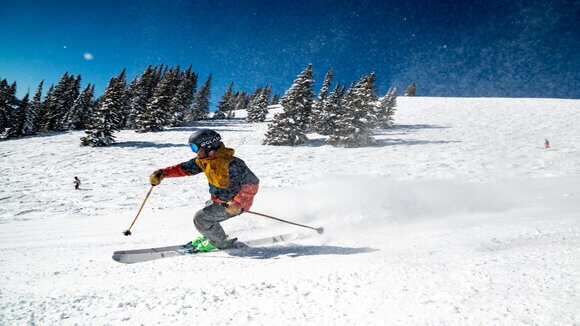Snow Train Or Fly: What Works Best?
For anyone who loves hitting the slopes in winter, an ongoing question is should you fly or take the train to your winter ski destination? There’s more to consider than you might think – especially as a special snow train has been created for skiers.
This season, as warmer weathers have led to less snow than usual, climate change is at the forefront of our minds. At the same time, prices are going up, no matter how you travel. There’s also a question of time. The train takes longer, surely? But with airport queues and potential delays, does it really?
To help you answer these timely questions, we take a look at the pros and cons of flying or taking the snow train to your ski destination.
Snow trains
Some people love flying, but train travel is becoming ever more popular, and train companies are responding with some great new routes and ways of getting to specific ski resorts. The ski train, or snow train, leaves from London at 8pm at night. You can sleep on the train and wake up at your destination in France. Alternatively, you can take the Eurostar to Brussels and change onto the ICE train to Cologne, Germany, and then on to Austria on the Nightjet sleeper train. If you love the journey as much as the destination, taking the train is a relaxing way to travel. But if you just want to get there pronto, like having more choice in terms of when you travel, or you’re skiing further afield, then flying remains the easiest option.
Climate crisis
As this (currently) snow-scarce season in Europe shows, winter sports lovers are a little closer to the issue of climate change than most holidaymakers. We need the snow and the ice-covered mountains, and as the planet warms, certain snow resorts are in danger. Yes, running a ski resort does use a lot of energy, though many resorts are making changes to work more sustainably. But by far the biggest impact on your carbon footprint is flying: flying from London to Paris emits 14 times more CO2 than taking the same journey by train. When it comes to the climate crisis, traveling by train wins hands down.
Luggage
If you have your own gear, travelling to the ski resort means you need to take a hefty volume of luggage, like skis, helmets and ski suits. When you arrive at the airport with these items you might be in for a nasty surprise: it’s not unusual for airlines to charge over £70 for the privilege of taking these items with you. In comparison, the Eurostar allows two bags. There is also no weight restriction on your luggage on the Eurostar, unlike when travelling by plane. There is a size limit though: the two bags you are allowed must come in at a max of 85cms long for each. But considering the allowances you get here, that’s a small concession.
Duration
Everyone assumes flying is going to be quicker than taking the train, and if we’re talking about just the time in the air, yes, of course it is. But when we take the plane, we all know it’s not just the time on the plane we have to factor in. Long queues at security and flight delays are all situations that at any time we can encounter when flying. While the time you spend actually travelling might be longer when you take the train, there’s less waiting around and more time relaxing on the train with beautiful scenery gliding past your window with a drink in your hand. And depending on where you live, flying may still be quicker even when factoring in faffing time. In all, train routes to France certainly make for an alternative worth considering.
Price
One of the main reasons many travellers choose the plane over the train is the cost. It’s a sad truth that in many cases travelling by train is more expensive than flying. But things are less cut and dried when you factor in the cost of transfers from the airport to your resort when flying. And If you book early and direct with Eurostar it’s possible to get a good deal on train travel. As the cost of flying continues to rise, the balance is certainly not as tipped as it once was.
If you’re heading to the slopes this winter make sure to get protected with Switched On’s specialist winter sports cover. It’s feature packed policies include a 24/7 emergency medical helpline, automatic cover for your gadgets and much more. Get a quick quote here.


